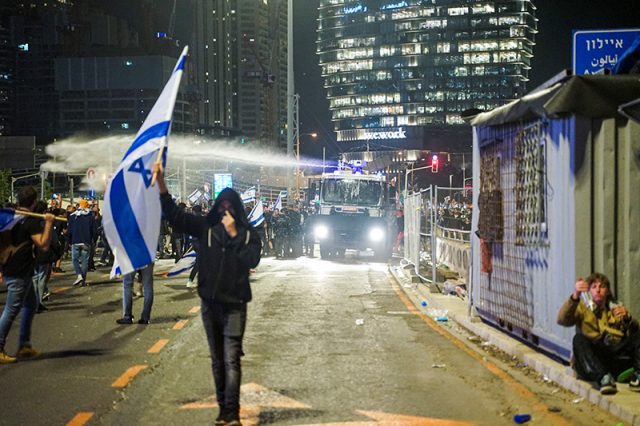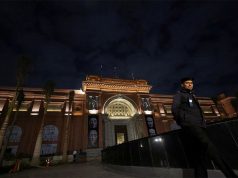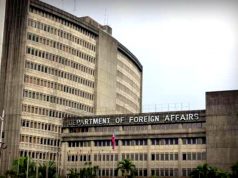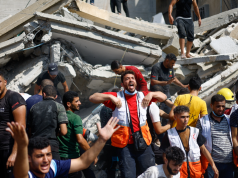
GAZA— Arab broadcasters carried rolling coverage of Israeli protests, strikes and political chaos on Monday, drawing the rapt attention of viewers to the internal fight over government plans to overhaul the judiciary.
The crisis featured far and wide, from the pan-Arab channel Al Jazeera, whose ticker was dominated by a stream of news from Israel, to al-Manar, run by the Iran-backed Lebanese group Hezbollah, which led its evening newscast with the story.
Some Arabs said they hoped the crisis would lead to Prime Minister Benjamin Netanyahu’s political demise. Others expressed hope of more far-reaching consequences for Israel, which fought numerous wars with Arab adversaries after its establishment in 1948 and occupies land the Palestinians seek for a state.
“As an Arab citizen I think that this is the beginning of the end of Israel, God willing,” said Qusai al-Qaisi, a citizen of Jordan, whose government signed a peace treaty with Israel in 1994. “I don’t want to say that I’m happy but I’m really happy that this is happening there,” he said.
The sentiment was echoed by Mohammad Abdullatif in Syria, from which Israel captured the Golan Heights in a 1967 war. “What’s happening is definitely, for any Arab, good news,” said Abdullatif, 39.
Gaza political analyst Talal Okal said the crisis had brought a sense of relief among Palestinians.
“We hope it doesn’t settle any time soon, and we hope it escalates and gets worse,” he said. “But there is also a fear, they may carry out military adventures or wars to escape the internal crisis.”
The Israeli government plan to tighten parliament’s control over judicial processes triggered some of the biggest mass protests in the country’s 75-year-old history, with opponents in Israel calling the plan a threat to democracy.
Netanyahu came under pressure to ease tensions overnight when protests grew over his sacking of Defense Minister Yoav Gallant, who had said the coalition’s judicial overhaul threatened Israeli security.
Late on Monday, Netanyahu announced he would open talks on the bitterly contested plans amid concerns the divisions could fracture his three-month-old coalition or escalate into violence.
‘Of their own making’
“The division is of their own making and now it is hunting them down,” said Nael Meqdad, 43, a Palestinian in the Gaza Strip. He hoped it would ease pressure on Palestinians amidst a surge in violence in the Israeli-occupied West Bank.
Some Palestinians compared the division in Israel to their own factional split between the Islamist group Hamas in Gaza and Fatah in the West Bank – a divide many Palestinians have accused Israel of feeding as it set back their national cause.
“What’s happening in Israel – they deserve it,” said Hani Abu Tarabeesh, another resident of Gaza.
“Just like they divided us, they are now getting divided.”
At broadcaster al-Manar, run by Hezbollah, which has fought numerous wars with Israel, a headline on its website declared that “complete paralysis” had afflicted the “enemy” due to strike action.
Israel faced a storm of Arab condemnation earlier this month when a leading member of Netanyahu’s government, Finance Minister Bezalel Smotrich, said there was no Palestinian history or culture and no such thing as a Palestinian people.
In the United Arab Emirates, one of several Arab states to normalize ties with Israel in recent years, political commentator Abdulkhaleq Abdulla said on Monday the domestic upheaval in Israel had no bearing on those agreements, known as the Abraham Accords, as commercial relations were ongoing.
But he said recent “racist statements” in Israel had caused a lot of concern.
In Egypt, which made peace with Israel in 1979, pensioner Hakem Sherif echoed criticism of Israeli policies towards the Palestinians, calling Israel a state without legitimacy.
But he also expressed respect for what he described as Israeli democracy, as he spoke in Cairo – where the army led the ouster of the country’s first democratically elected president in 2013 after the “Arab Spring” protests.
“Citizens have a space to express their opinions, they don’t randomly arrest or carry out violent dispersal of protests,” he said.
—Additional reporting by Jehad Abu Shalbak in Amman, Lisa Barrington in Dubai, Firas Makdesi in Damascus and Farah Saafan in Cairo; Writing by Tom Perry; Editing by Howard Goller









